Chapter Three—
Growing Up and Out of Colonialism
Nyandusi, Mule, Waicanguru, and Karanja could only accommodate to colonialism; their children were to supplant it. The older generation lent what support they could as their offspring scaled the steep pyramid of the colonial educational system and came out on top where, after independence, they could challenge the British for the management of the new state. The lives of the four future administrators we are studying were similar in this phase, but the ways they responded to the school system in this period presaged later differences in their careers.
Charles Kibe Karanja
Karanja, the father of the tea administrator, had held out against the new forces of colonialism as long as he could. As the son of Kiarii, he was a man of wealth and status in traditional society, with 160 acres of prime land and five wives. Christianity and wage employment offered him no advantages; they only threatened the system in which he was already an elite. He did seek to expand the benefit of his assets and grew wattle for the export market. This very market involvement, however, ultimately led him to realize that he had underestimated the force of the changes taking place around him. It became clear that his family would have to adapt if it was to retain its privileged position. In 1939 he went to Thika to sell a truckload of wattle bark and felt that he was cheated in the sale because he could not read. After discussing the matter with Kiarii, his father, he decided that despite the dangers of Christianity that infected the schools, one of his children would have to learn how to read, so as to represent the family's financial interests. Among his sons,
Kibe was obedient, had a good memory, and was interested, and so he was the one chosen.
Kibe wa Karanja was born in Karatu village of Ndarugu Location in Kiambu District in about 1931, the second child of Karanja's second wife, Njeri (more usually known by her nickname, Nyagitiri). As an adult, he would become general manager of the Kenya Tea Development Authority and be known as Charles Karanja.
Kibe was a very active child. At four he often followed his father to the field when he went to plant potatoes and tried unsuccessfully to imitate his digging with a panga (a machete). Nyagitiri trained her children when young to work, setting out two sticks and asking them to dig between them. As is common among the Kikuyu, friends used to compliment Nyagitiri on the child Kibe's brightness.
Kibe began his studies in September 1939 at the Ndarugu Out School of the Gospel Missionary Society, which later merged into the PCEA. To attend, he had to have special clothes, for the family of Karanja did not accept European dress. The head teacher took Karanja and young Kibe to a local shop, where they bought the shirt and shorts which constituted the school uniform.
When Karanja had decided to send Kibe to school, he gave the eight-year-old firm instructions that he must always obey his father and not become a Christian. The mission influence pervaded the schools in this era, however, and after only two years Kibe already was having doubts about traditional religious practices. In 1941, when Karanja slaughtered a goat for a Kikuyu ceremony, Kibe refused to eat it. Karanja in anger sent the boy off to tend the family's herd of goats while the other celebrants were eating. One hundred goats were beyond the capability of a ten-year-old, however, and unbeknownst to Kibe, some got away from him. Only when he was bringing the herd home at the end of the day did he see the wayward ones eating a neighbor's crops. He knew that he would be in trouble, and rather than face his father's wrath, he decided to run away.
He set out for a pyrethrum plantation where one of his father's relatives was a supervisor. It was two days' walk away, ten miles into the Aberdare Forest, and Kibe had to ask directions on the way, having never been there before. The first night he found himself at the forest's edge and asked someone to give him food and shelter. He knew there were wild animals in the forest and was afraid to go into it alone. He waited until another party passed along the path and then followed behind out of sight. Once there he got work through his relative for a wage of three shillings a month. After three weeks, however, Karanja got word of where he was and sent Kibe's older brother to fetch him home,
promising that the boy would not be beaten. Kibe never did get any pay for his three weeks' work.
Back at home, Kibe refused to go back to Ndarugu School, being shy of returning to something he had left. So Karanja arranged for him to go to Mutunguru Kikuyu Independent School, where a cousin was headmaster. The independent schools had been set up to escape the missionary objections to female circumcision, and doubtless Karanja welcomed the idea of getting education for his son without more Christian contamination.
The school was farther away from home, however, and Kibe had to do the milking before he went. One day he was late and for his tardiness was given five strokes of the cane (switch). Coming home that day, he and a friend agreed to meet the following morning and get to school early. They arranged that the one who first passed a certain point on the way to school would leave a branch to let the other know that he should hurry to catch up with him. But the friend forgot to leave the branch, and Kibe walked slowly, thinking that he must be early. When he got to school he saw that he was late and knew that he would be caned. So instead he went to play. He played hooky for a week until the teacher complained to Karanja.
Kibe knew that his father would beat him, so this time he ran away to work on a coffee plantation 25 km (15 mi.) away. Once again he managed to stay only three weeks before he was brought home, but this time he returned with 2.15 shillings in earnings. He refused to return to school and instead stayed home to tend the sheep and goats and to master a new Kikuyu dance, the Muthuu. The dance was very popular among boys of that generation, involving bells tied to the legs and the twirling of imitation swords. Sometimes the boys would be paid to perform it as a praise dance for someone. Forty years later Kibe would still leap to his feet at the mention of the Muthuu to demonstrate its rhythm and basic steps.
In 1942 Karanja asked Kibe if he'd like to return to school, and he finally agreed. He was sent back to the mission school at Ndarugu where he had first begun. Kibe had settled down and become serious about his studies at this point, and the teacher had difficulty in deciding which class to place him in. In those days Africans received two years of preprimary school before they took the regulation Standards 1 and 2, after which they had to pass the first of a series of competitive exams before going further. The teacher decided to try Kibe in Standard 2, where he quickly rose to the head of the class. At the end of the year he took the exam that passed him out of the school.
For Standard 3 Kibe went to Ng'enda Primary School, which was too
far away for him to live at home. The first term he stayed in a bungalow with other boys, and they cooked for themselves. The second term he stayed with a teacher, for whom he worked. For the third he lived with a friend nearby, whose mother cooked for them. Children were not "cared for" in boarding schools in this era.
At the end of Standard 3 Kibe took the Common Entrance Exam, on which he did extremely well, and was picked by interview to go to the Presbyterian Thogoto Primary School at Kikuyu. No more than ten of the class at Ng'enda were ever selected to go on, and Kibe's new school was the most prestigious in central Kenya. At every one of the frequent examination points, the educational pyramid narrowed considerably and the competition was intense.
When Kibe entered Thogoto at age thirteen in 1944, he found no one whom he knew, and students from as far away as Nyeri and Nakuru were there. In fact, he and Ishmael Muriithi (the veterinarian) did Standard 6 together in 1946. The annual fees, including board and uniforms, were eighty shillings ($16.15). Karanja was proud that, as a rich man, he was always able to pay the school fees for his children. (Many of his other offspring subsequently opted for education.) Many African youngsters have to drop out of school because of the inability of their families to pay their school fees; until relatively recently, others have been unable even to begin. The brightest poor students often get scholarships or are helped by their relatives with their fees. But if they have the kind of rocky beginning to their education that Kibe had, even the gifted youths can fall by the wayside if money is scarce for their families. Children whose parents are better off and clearly understand the importance of education to upward mobility in Kenyan society have a definite advantage in an otherwise meritocratic climb to the top.
There were seventy-two in the entering class and Kibe's class standing was forty-ninth in the first term and fiftieth in the second. At this point he realized that only fifty students were going to be permitted to continue to Standard 5. He was on the borderline, and he thought that if he were dropped, his father would decline to send him to another school. He was already working hard and didn't know how to improve. So he befriended the boy who was first in the class. He followed him absolutely everywhere he went, often without the other's realizing it. When he slept, Kibe slept; when he played, Kibe played; and most important, whenever he studied, Kibe studied. Kibe's class standing rose to twenty-sixth. From this experience he realized that he hadn't been studying as hard as he could, and in Standard 5 he spent most of his time reading. He finished that year in the top six in the class, and Standard 6 in the top ten. There were only a few whom he could never beat in school, among them Margaret Wambui, daughter of Jomo Kenyatta.
Kibe was circumcised during the school holidays in August 1946, but he declined to participate in the traditional initiation education and the ceremony of "rebirth," for he felt he was a Christian. Karanja accepted this affront to his beliefs because Kibe was the only boy from the area who had been able to reach such prestigious heights in the educational system. When Kibe was baptized into the church he took the name Charles and became officially known as Charles Kibe Karanja. In this way his given name was subtly transformed into a middle initial, and he has since been known as Charles Karanja, confusing him somewhat with his father among the Kikuyu. The same happened to Harris Mutio Mule. Ishmael Muriithi and Simeon Nyachae dealt with the dilemmas of English naming conventions by assuming their given names as their surnames.
Charles Kibe Karanja took the Kenya African Primary Examination (KAPE) in November 1946 and passed well with nine points. He had applied to go to the elite Alliance High School, however, and when he was turned down there, he was offered admission at an agricultural training school instead. He declined the place, for his father said that agricultural instructors and teachers never become rich.
Instead, he looked for a school in which he could repeat Standard 6 and the exam and was accepted at St. Mary's Primary School, Lioki. While he was there a protest developed over the food they were being given—maize without the accompanying beans to which the Kikuyu are accustomed. Other boys called a meeting to discuss a strike, at which Kibe spoke forcefully in favor of the action. He and his cohorts went home in protest, but after two weeks Kibe's father sent him back to see what had happened. He found that all the others had already returned and been disciplined. Furthermore, someone had told the headmaster of his protest speech. He received eight strokes of the cane and as a result decided never again to join a strike.
This time he passed very well, with fifteen points, but he had decided not to risk application to the Protestant Alliance High School again. Thus he was one of five boys in his class of fifty at St. Mary's who was selected to go to the nearly as prestigious Catholic equivalent, Mangu High School. This pair of school choices inclined Charles Karanja away from the Presbyterians and toward the Roman Catholic church, which he joined at Mangu in 1949. Even his father, Karanja wa Kiarii, in his very old age was eventually baptized into the faith. Charles Karanja, the only one of the four administrators whose parents were not Christian, was also the only one who attended church frequently as an adult. It is unusual for well-educated Africans to be regular church attenders, even for those such as Ishmael Muriithi (the veterinarian) who took their membership seriously.[1]
When Charles Karanja entered Mangu High School, near Thika, in
January 1948, his class consisted of but twenty-five boys, the whole school of only a hundred. Most of them were destined for elite positions in Kenyan society. (See plate 10.) Mwai Kibaki, who later became vice-president of Kenya, was in the class ahead of him, a class that ultimately produced ten medical doctors as well. A tight network of friendships, cutting across district and ethnic boundaries, was formed during these years. (This phenomenon was somewhat less characteristic of the later generations of educational elites, who passed through a broader, less selective funnel and who therefore more often attended schools near home with others of their ethnic group.) These networks of "old school boys" were frequently quite important to Kenyan policy-making.
At Mangu Charles was the best debater in his class, ran for Kiambu in an athletics meet in Nyeri in 1951, and played on the second string of the football team. The game was played without shoes, and he complained that this hurt his toes. He conformed strictly to the school rules and went through four years without ever being punished, which was very unusual. As a consequence he was made first a prefect and then deputy head prefect in his final year. Prefects were appointed by the school administration and were an important part of the way in which these schools sought to socialize future elites in the exercise of authority.[2] Charles was an effective and hard disciplinarian.
The pattern of selective national exams continued at Mangu, with one after two years and the Ordinary Level School Certificate at the end of four. (See fig. 3.1.) All the remaining members of his class passed the latter, but Charles was one of only eight who was in the First Division. Nonetheless, he could not go to the elite Makerere College in Uganda. He had received only a Pass on the English-language portion of the exam. This was ironic, for he was among the top in the subject at Mangu, and his essays were often read in class. He had misinterpreted a key essay question on the exam and because of that error lost his chance to pursue a career in the social sciences or humanities.
He went instead to the Kampala (Uganda) Engineering School for a five-year diploma course in civil engineering in 1952. (No degree programs of any kind were available for Africans in East Africa until 1954.) This too was a prestigious course; there were those who were accepted at Makerere who opted for the Engineering School instead. At one point all of the African engineers in the Kenyan Ministry of Works had been through it. The course was a rigorous, practical one, teaching applied rather than pure science. The students studied surveying and the construction of buildings, roads, and water supplies, doing a great deal of practical work in the process. Charles finished somewhere in the upper half of his class.
He held a number of school offices while at Kampala. He was elected
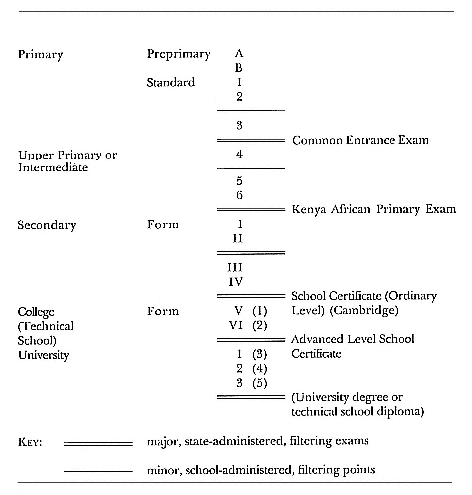
Fig. 3.1
The Kenyan colonial education system for Africans
NOTE: The Kenyan African educational system was in flux in the colonial period, and the
requirements and names of various stages shifted at some points. The above is a
modal picture of the system.
class representative to the school's Student Club in his first year, was reelected each subsequent year, and was unanimously selected as president in his final year. At one point he served as catering officer for the students and at others was president of the Debating Society and of the Catholic student group. Charles's love of office and speaking were such that he and many of his classmates expected him to run for Parliament one day, something that in fact never came to pass.
Mau Mau from Kiambu
This aptitude for politics did not lead Charles Karanja to involvement in the struggles sweeping his homeland during his school years. The simmering revolt of the Kikuyus against their restricted access to land and colonialism's white domination finally led to the declaration of a state of emergency by the colonial government in 1952. Central Province was effectively placed under military occupation, and Kikuyus were repatriated to their homes from jobs in the urban areas and the "White Highlands." Many fled into the forests to fight a guerrilla war, and thousands of others were put in detention for their suspected involvement. Kikuyus themselves were bitterly divided between those who supported the Mau Mau (now known as the freedom fighters) and the Home Guards. The latter assisted the British to suppress the uprising because of the Mau Mau's brutality and rejection of both Christian and traditional religious values.[3]
Karanja wa Kiarii and his family, however, remained uninvolved in the struggle. No member of the family either took the Mau Mau oath or identified with the Home Guards. Many of the wealthy Kikuyu were able to escape without ever being forced by either side to commit themselves. Some of Karanja wa Kiarii's land was taken over for a "strategic hamlet" type of village, into which the Kikuyus were herded to keep them from the guerrillas. But he was subsequently compensated for this loss during the process of land registration and consolidation that the British forced on the Kikuyu as part of the pacification effort.
Charles Karanja himself was never asked to take the oath. There seems to have been a tacit decision on the part of the Mau Mau not to involve the Kikuyu student elite, so as to speed them on their way to the education that would eventually pose a different type of challenge to the British. And because of that disengagement the government did not disrupt the progress of Kikuyus in school. Charles Karanja was even able to discuss politics in Uganda to an extent that would have been dangerous in Kenya. He was harassed somewhat while at home for the holidays, but not overly much. He is unusually dark for a Kikuyu and so generally wasn't taken for one as long as he kept quiet. He was detained in a Mau Mau screening camp for two weeks when he finished at Kampala, but was released when he persuaded the Home Guard elders that he had never taken the oath. In his own words, "As a tribe we suffered, but I didn't personally."
After graduation Charles Karanja married Philomena Ndanga on December 22, 1956. Her father was a court elder, like Elijah Waicanguru and Philip Mule, and her grandfather had been a chief. Karanja had met her at a Catholic church near his home in 1949. She went to Loreto Convent, Limuru, for her secondary education. She qualified as a
primary-school teacher in 1953 and started teaching early in 1954. In October of that year she bore Charles a son. In accordance with Kikuyu custom, Charles's father paid a dowry to her parents of a thousand shillings, two heifer calves, and five lambs. It was mutually agreed that the actual marriage had to be postponed until after Charles Karanja's graduation at the end of November 1956.
With marriage and graduation Charles assumed a position as engineering assistant in Nakuru with the Ministry of Works, which had given him a full bursary (scholarship) at Kampala. His education was extended further in 1961 when the Kenya government decided to provide scholarships for Africans with his qualifications to go oversees for an engineering degree. He was sent to the University of Toronto in Canada, without his wife and family, which by then consisted of four children. The combination of homesickness for his family and excitement at Kenya's impending independence led him to abort his degree program after one year and to return home in August 1962. This decision effectively ended Charles Karanja's chances of ever reaching the highest engineering positions in the Kenya government.
Karanja's school years exhibited his willfulness, ambition, and love for public roles. They also brought him to an acceptance of authority and gave him practice in its exercise. His mistaken reading of a single essay question on the English portion of the Secondary School Certificate exam, by precluding his study of the social sciences, consigned him to a technical career.
Simeon Nyachae
Chief Secretary Simeon Nyachae's early years were spent with his mother. He was later to remark, "In a polygamous home the women tend to take hold of the children [especially when they are young], leaving the father nowhere." As Nyachae grew up he became unusually close to his father, but in the years before his schooling he belonged to his mother. Pauline Bosibori had but two children, and James Oiruria was only two years older than Nyachae. The two brothers were very close. Nyachae was brighter, more aggressive, and more talkative (like his mother), so that he tended to dominate Oiruria. But whatever conflicts they had were quickly compromised in their friendship. These earliest years included ones on the mission station while their mother was learning to read.
When Nyachae was about eight years old his father employed a teacher for several of his boys at his home. After a year or so, in 1941, Musa Nyandusi sent Nyachae and Oiruria to begin their formal education at Nyanchwa Primary School, which was run by the Seventh-Day
Adventists. During these years the boys lived at home, and Pauline Bosibori watched over their education. She would punish them with a switch if they missed classes, and she drilled them on their arithmetic. The boys would cry if they got a sum wrong and laugh if it was right. Because they had a literate mother, Oiruria and Nyachae got more help at home with their education than was usual for those of their generation. Simeon Nyachae was the timekeeper at Nyanchwa, the one who hand rings the bell that signals the start and end of classes. There would be twenty to thirty children in a class at Nyanchwa. All writing was done with chalk on wood-frame slates. The first several years of primary education were in the local vernacular, after which teaching in Swahili (East Africa's Bantu lingua franca) was begun. Instruction in English began in intermediate school. All the national examination hurdles through which Kenyan children pass were (and still are) taken in Swahili or English. A gift for languages therefore is a prerequisite to education in Kenya.
In 1947 the two brothers and two of Nyandusi's other sons graduated to intermediate school and were sent to Kereri. It was too far away for the boys to stay at home, so Nyandusi arranged a place for them with Stephen Obure, an African Native Council employee whose son much later became a member of Parliament from Kisii. Nyachae left his brother behind at Kereri in 1949 and joined the Kisii government African High School, which was built on land donated by his father. This secondary school was not as cosmopolitan as those attended by Karanja, Mule, and Muriithi, for only 20 percent of its students came from outside Kisii District. Chief Nyandusi would visit the school regularly to check on his son's progress, until Nyachae terminated his secondary education in 1953.
During his school years Nyachae excelled in athletics. He was first in Nyanza Province in the hurdles and the long jump, and his record in the latter stood for thirteen years. He ran the 100- and 440-yard dashes as well, but he did not play football (soccer). When he was young he had hit his head on a goalpost playing the game, and his father forbade his further participation in the sport.
Most of Musa Nyandusi's sons did poorly in school. This was common for the children of chiefs, unlike the other African elites. The chiefs were more likely to be polygamous and to have illiterate wives. Their many children also suffered from being too visibly close to wealth and power, and so they often would be bossy, flash money around, and fail to apply themselves seriously to their studies. Given the extreme competitiveness of education in that generation, this lack of attention was fatal to their progress. Simeon Nyachae was different; he was bright, more serious about his studies, and less affected by his father's status.
Nyandusi's first son, Ayako, had also done well in school, and the chief had hoped that he would succeed him in office, although the post was not hereditary. Ayako died in 1951, however, and Musa Nyandusi increasingly came to focus on Nyachae. He would take him in his car to meetings, send him round to collect the money from his several flour mills, and delegate him to report on coffee Cooperative Society meetings.
Although Nyachae did well in school, he was more of an all-rounder than a scholar. It appeared to his teachers that his maturity was ahead of his academic development. Thus some of them concurred with Musa Nyandusi when he withdrew Nyachae from the system in 1953 when he was a year shy of the secondary Ordinary Level School Certificate exam. Nyandusi felt that a higher education was unnecessary for the chief's career that he wanted for his son. (See fig. 3.1.)
In 1954 Nyachae began work as a district clerk, stationed in Nyaribari Location where his father was chief. In effect he was being apprenticed. During the time that he worked there he was sent for some basic administrative courses at Maseno Government Training Institute.
In 1954 the elders also helped him select a wife, Esther Nyaboke, who came from a prominent family in a neighboring clan, was sixteen years old, and had gone as far as Standard 4 in primary school. Later that year she bore him a daughter. She was ultimately to bear him several more children, including sons.[*] But in the first years of the marriage the elders were concerned that the couple had not had a son. The elders and Musa Nyandusi put considerable pressure on Nyachae to take a second wife, which he did in 1955. This wife, Druscilla Kerubo, died three months after she gave birth to a daughter, who was then reared in her early years by her grandmother, Pauline Bosibori.
In 1957 Nyachae took as his wife Martha Mwango, who like Esther was sixteen at the time and had left school after Standard 4. She came from another prominent family and was the half-sister of Lawrence Sagini, who was a close friend and adviser to Nyachae and later became Kisii's first member of Parliament. Sagini's influence was important in gaining consent for the marriage, for Martha was to have the lower status of being a second wife. Between 1958 and 1975 Martha gave Nyachae several more children.
Both of these wives remained in Kisii when Nyachae moved to a national-level career in 1960. He himself feels that his polygamy was a mistake, that a father cannot give adequate attention to a family of this
[*] Gusii custom dictates that one's children should never be counted, which makes it inappropriate to give their names or birth dates in a public document. Out of respect for this custom, the details of Nyachae's family are kept vague here.
nature, and that there is a danger that his children will be emotionally lost to him. The marriages of these years reflected the image his father and the elders held of the type of wives that were appropriate to a chief. He himself would never say so, but these women clearly were not ideally suited to help him in the national arena in which he was to operate subsequently. Polygamy at least enabled him to marry more advantageously later without severing his responsibilities to his early wives through divorce.
By 1957 it was evident to both Nyachae and Musa Nyandusi that they had made a mistake in renouncing his higher education. Ghana won its independence from Great Britain in that year, and it was clear that able Africans could aspire to considerably higher offices than that of chief. His mother, Pauline Bosibori, dreamed that Nyachae would not become a chief, and he himself was quite upset when his friend and brother-in-law, Sagini, won a scholarship to pursue his B.A. in the United States.
With the help of the district commissioner and Robert LeVine, an American anthropologist, Nyachae found a place at South Devon Technical College at Torquay in the United Kingdom, where he could pursue a one-year Diploma in Public and Social Administration. To get him there Musa Nyandusi shrewdly insisted on raising assistance for his expenses through the African District Council (of which he was vice-chair) so that Nyachae and the Gusii would both feel that he had an obligation to serve them in administration.
Torquay was a relatively small and provincial college of three thousand in those days, and its public-administration program was designed for those who would serve in local governments and the middle levels of welfare administration. Those who were expected to hold the highest administrative posts in Great Britain and the colonies would have studied instead at Oxford or Cambridge. The particular program in which Nyachae participated was designed for students from the colonies; a group photo from the period shows Nyachae with students from Sarawak, Zambia, Borneo, and Malawi. (See plate 11.) The curriculum covered the geography of developing countries, community economics, social policy, law, government, and administration. The things that struck Nyachae about the program were the comparisons of administrative systems that it offered and the openness to criticism of British government. Visits to farms, local council debates, and central ministries were frequent.[4] His "digs" were with a local family. The amount, quality, and breadth of Nyachae's education were limited, compared with the other three managers and with most of those who achieved the most senior administrative (as opposed to political) positions in independent Kenya.
Upon his return to Kenya, Nyachae became a district assistant in the Provincial Administration. This position was the African equivalent of
the district officer, the office that an Englishman first held on entry to this elite cadre, which was responsible for the general administration of the colony. Through Nyandusi's influence Nyachae's first posting was to Kisii. There his main duties were assisting the cooperative movement, supervising the traditional courts, and facilitating the expansion of education. More schools were needed as the political struggle for independence burst out of the strictures of the Emergency. But the missions, which were still the primary vehicle for education, had difficulty in getting land. Nyachae spent a great deal of time working with the District Education Board to get land set aside for the purpose. He also supervised Kisii's four tribunal courts, making sure that their application of customary law did not contradict the Penal or Civil Procedure Codes. As a district assistant, he had the powers of a third-class magistrate and could overturn certain classes of cases. Others could be referred to the district commissioner in his capacity as a first-class magistrate. The colonial Provincial Administration combined aspects of the executive, legislative, and judicial functions in its governance of Africans. In Kisii, though adjustments to fines were common, it was rare for the Provincial Administration to have to overturn a tribunal court decision.
Nyachae wanted to move out from under his father's wing and finally succeeded in getting transferred out of Kisii in 1960. He was posted to Ukwala in Siaya District, a Luo area. There was tension between the Luos and the Gusii at the time, and Nyachae did not feel comfortable administering the Luo; he resigned immediately. He became instead the labor and welfare officer and the first African in management of the East African Breweries. Musa Nyandusi's shrewdness in asking council assistance for Nyachae's studies in the U.K. became evident at this point. A delegation of eight Kisii chiefs, including Nyandusi, was sent to Nairobi, and Nyachae was summoned to the office of the chief native commissioner. Under great pressure Nyachae finally consented to rejoin the Provincial Administration, but only on condition that he not be sent back to Ukwala.
The Political Struggle for Independence
In November 1961 Nyachae was posted to Kangundo Division in Machakos District, where he served first as a district assistant and then as the district officer for the division. This was one of the more difficult Provincial Administration postings in Kenya at the time because it was a center of agitation against British rule.
The earliest forms of resistance to colonialism had been directed against the state itself. However, beginning with what are known as the Harry Thuku riots of 1922,[5] protest turned to a demand for increased rights for Africans within the state. Jomo Kenyatta, a nationalist Kikuyu,
was the leader of this struggle from the late 1920s, even during his extended stays in England.[6] As the people most disrupted and changed by colonialism, the Kikuyu played a leading role in the accelerating progress of African nationalism, and it was among them that the Mau Mau uprising occurred. From the 1930s, however, Kenyatta had used the vehicle, first, of the Kikuyu Central Association, and second, of his Kenya African Union (KAU) to spread the nationalist gospel among the country's other peoples. Although Kenyatta denied to his death that either he or the KAU had any involvement in Mau Mau, he and five other officers of the KAU were detained when the State of Emergency was declared. Among those so imprisoned without trial or sentence was Paul Ngei, a Kamba who would serve in the independent country's cabinet into the 1980s. Kangundo, to which Nyachae was posted, was his home.
During the time of the Emergency, African politics were heavily restricted, especially in Central Province. Country wide African political parties were banned, for example, and the district-level parties that were permitted contributed to the fragmented, ethnic politics that were to trouble Kenya after independence.[7] Men such as Tom Mboya used the labor movement and other vehicles to keep the struggle for African political rights alive with a momentum that accelerated through the 1950s despite (or perhaps because of) the Emergency.[8] African demand for the vote and the end of colonialism became genuinely nationwide, and political participation was truly a mass movement. By the end of the decade it was evident that universal suffrage, majority rule, African governance, and independence were on the horizon. As a result of sustained pressure by the "legal" African nationalist parties, Jomo Kenyatta and the rest of the KAU executive were released from detention in August 1961. An African coalition government was formed in 1962 under the authority of the colonial governor.[9][*] With full internal self-government coming in 1963, the air was filled with excited anticipation on the part of Africans and with dread anxiety from Europeans and those who had supported their colonial endeavor.
Kangundo was Paul Ngei's constituency as well as his home, and he did nothing to ease the task of the colonial administration during this difficult time of transition. People were expecting to be given land for free and therefore were refusing to cooperate in settlement schemes in which they would be expected to pay. Kenyatta had not yet given his "no free things" speech, and Ngei was encouraging people not to buy. The colonial chiefs were deeply unpopular and subject to constant harassment. A great deal of the antagonism was directed at the senior chief,
[*] The African ministers governed under the authority of the colonial governor. Full internal self-government was granted in 1963.
Uku, who was taking a hard line in his insistence on order. Having a senior chief for a father himself, Nyachae was sympathetic to the chiefs and gave them public backing. But he also recognized the forces of change at work and tried to turn the uncompromising ones such as Uku from their self-destructive course. Even at this early stage in his career Nyachae seemed to have his characteristic ability to sort out the essential from the peripheral objectives and to be unbending in his pursuit of the former and flexible about the latter.
In these times it was imperative to be in close touch with the people, particularly as Nyachae was frustrated by Ngei's unwillingness to listen to reason. "A leader is bound to be able to listen carefully to what other people are saying and [Nyachae] was of that caliber. He would think carefully before deciding." Public meetings (barazas ) did not work as a means of communication. As Nyachae recalls:
It is extremely misleading to go to a public meeting and see people clapping. It doesn't mean that they are convinced. . . . We traveled in the countryside and slept in tents to let them understand me and vice versa. . . . We had the best understanding when we walked. Though we have more administrators now, they do not understand the ordinary people the way we did. The most effective communication is to visit in their homes.
He remained in Kangundo Division for only six months, too short a period to have a real impact on it, but he considered the experience to be a seminal one in his career. From it he understood what field administration really means and that independence would bring problems as well as prospects.
Nyachae's next assignment was to the Kenya Institute of Administration, where he took the district officer's course. There he took the law exam and qualified as a first-class magistrate, a role which at the time was combined with that of district commissioner. That course and the one on colonial administration to which he was sent in 1963 at Cambridge University were also designed to socialize the new recruits into their roles as their colonial predecessors had understood them. In addition to training in the law and administrative practice, there was instruction in small arms, horseback riding, and table manners. These courses symbolized the kind of administrative and social role they were expected to play in Kenyan society. The socialization process was clearly rushed, and one would have expected its impact to be diminished as a result. For example, Nyachae was able to stay for only six of the nine required months at Cambridge because the Kenyan government needed him. But the instruction had its effect nonetheless. The law-and-order component of the role remained the primary concern of the Africans inducted into the Provincial Administration in this period, and they re-
sisted attempts by a later generation of expatriate administrative trainers to shift the courses decisively toward the primacy of a developmental role by stressing economics, sociology, and planning.[10] Although many of them were strong supporters of economic and social development, they firmly believed that it could be achieved only if law and order were maintained, and they considered the latter their first priority.
How were the British administrators able to socialize their successors into a law-and-order orientation when they failed to transmit many of the other values they held dear? First of all, this was the role to which they actually gave primacy, whatever their intentions. Actions speak louder than words, and the Provincial Administration had just emerged from a period of intense effort to suppress the Mau Mau rebellion. Second, the law-and-order role not only was the one their first superiors expected them to play, it also was the one they had been able to observe from afar as they were growing up. It was a role in which many of their parents had assisted, and the public expected them to play it when they put on the Provincial Administration uniform. Third, the role met the requirements of the newly independent African state. Despite the sincere rhetoric of development which African politicians used, they were most concerned with the survival of the regime itself in the face of deep interethnic conflicts and dangerously inflated expectations.[11] They perceived the new state as needing security even more than it needed prosperity, and they rewarded careers accordingly. Thus the traditional role expectations of the Provincial Administration were reinforced from all directions.
Between the Kenya Institute of Administration and the Cambridge courses Nyachae also served briefly in Makweni Division of Machakos District. During this period Nyachae had a serious accident in his Land Rover, which left him with recurrent back troubles. When Nyachae returned to the Provincial Administration from Cambridge, England, in March 1964, he was to face the challenge of governing an independent, not a colonial, Kenya.
Nyachae's entire upbringing aimed him toward the Provincial Administration and its law-and-order orientation. His father's example and wishes so inclined him, and his early withdrawal from secondary school precluded more professional options.
Ishmael Muriithi
Ishmael Muriithi, the veterinarian, was born on November 18, 1929, at Kindara village of Ihithe Sub-Location, Thigingi Location, in Nyeri District. (See plate 12.) In December he was baptized into the Presbyterian church. His childhood was an uneventful and typical one. He played,
assisted in the care of his younger brothers and sisters, and helped to tend the livestock. From an early age he enjoyed looking after the farm's animals, worried about them when they were sick, and was so quick and good at milking that none of the cows he worked ever got mastitis.
He started school at what was then the relatively young age of eight, spent a year first at Ihithe Primary School and then went on to Wandumbi in the same sub-location. He was very serious about his studies; he never objected to doing his homework, was always on time for school, and took coaching from his father.
Muriithi did well on the Common Entrance Examination and was accepted at the PCEA Thogoto Primary School at Kikuyu in Kiambu District in 1943. (See fig. 3.1.) A younger brother who would later join him in veterinary work, Dan Mbogo, was born in the same year. There was a famine in the province at the time, and there was some concern that he might not be able to get enough to eat at Thogoto, but Muriithi insisted on going anyway. His father, Elijah Waicanguru, was already a man of substance and had no trouble meeting the school fees for his children's educational careers. Nonetheless, Muriithi always used well the money he was given, not splurging it, as did many other sons of the well-to-do. He also did not allow the status of being in such an elite school go to his head. At home on the holidays he helped with harvesting, weeding, cutting the firewood, milking, terracing, and so on. In later years he would be unusual in insisting on the same farm-work discipline for his own children. During the Christmas holidays he joined the carollers singing from house to house in the village. He also led a choir that performed throughout the district.
Muriithi's first sitting of the Kenya African Primary Examination was not up to his ambitions, and he repeated the year at Thogoto, joining the class of Charles Karanja. His father wanted to send him to another school, but the headmaster argued that the boy was working hard and had just had bad luck. Among his teachers at Thogoto was James Gichuru, who was later to be central in the formation of the Kenya African National Union (KANU) and a cabinet minister. Muriithi did much better on the 1946 exam; his certificate shows four passes and four credits, including the crucial ones in English and mathematics.
He entered Alliance High, the elite Protestant school, in 1947. Six years earlier Alliance had become the first Kenyan school to offer four years of secondary education to Africans.[12] (Makerere was in Uganda.) Muriithi was an "all-rounder" at Alliance. He played on the first eleven for football (soccer) and developed a lifelong love for tennis. He also was recognized for his leadership abilities; he became a prefect in 1949 and was made senior prefect of Wilberforce House in 1950. The prefects were responsible for the organization and discipline of the school-
boys, and he made his house something to reckon with in school activities. In the weekly meetings of senior prefects, "his was not the sort of mind who dithered. He formed his opinions quickly, expressed his views forcefully and stood by them." He was also a very down-to-earth person. Each house had its own garden, and forty years later a classmate could still "see him wearing his pink working shirt and his jembe [hoe] on his shoulder going to and from the shamba."
Alliance High School was a very special place in those years, offering, together with Mangu, the highest education available to Africans in Kenya at the time. A contemporary remarks:
To even go there was a very major achievement. . . . It was a wonderful life—we had water regularly, uniforms, highly trained English teachers, . . . sporting facilities, . . . and the opportunity to play the piano. . . . We enjoyed special privileges such as a special coach on the train [when we went home to Nyeri for the holidays].
The "Old Boys" who went to Alliance in these years were disproportionately represented in the administrative leadership of Kenya after independence. Their mutual respect for one another's accomplishments and their network of friendships and acquaintanceships often facilitated the business of government. Muriithi was greatly helped in later years, for example, by the fact that he spent 1947 and 1948 at Alliance with Geoffrey Kariithi, who later held the powerful post of head of the civil service under President Kenyatta.
Under the legendary leadership of Carey Francis, Alliance was modeled on the ideals of service by Christian gentlemen which underlay the English public (i.e., prep) school. Discipline was extremely strict, and the style of leadership authoritarian. Francis identified deeply with his students and with African progress, but he held views on matters such as politics and salary differentials between Africans and Europeans that his charges deeply resented at times. Thus the gap between the students and their schoolmasters was greater than in the English public schools after which Alliance was modeled.[13] A classmate of Muriithi's observed:
Alliance was a mixture of conflicting relationships. . . . There we were the cream and here were people who had given up great opportunities back home [in England] to come to Kenya to educate the black people. But there was a social gap, not hostility but an enormous gap [all the same]. They would invite us to their homes from time to time, but you never developed totally free rapport.
They had in their own minds stereotyped professions for which they were preparing us—teaching, medicine, [the] civil service, [the] ministry, agriculture, and veterinary [medicine]. It never occurred to them that
some of us could decide to go and do law or join a private firm. . . . That set of values was being ingrained in us. . . . A lot of emphasis [was placed] on public service. The motto of Alliance is "Strong to Serve."
Carey Francis visited Muriithi's home in Nyeri, as he did with many of "his boys."[14] He and Elijah Waicanguru had a particular respect for each other, which Muriithi used to his advantage later. When Muriithi finished Makerere in 1956, his father, Chief Muhoya, and the Nyeri district commissioner put pressure on him to join the Provincial Administration. Muriithi used Carey Francis's advice to defend his commitment to the veterinary profession.
Muriithi showed a strong preference for the sciences in his schoolwork. He was much interested in nature and enjoyed the practical work of the labs. He was even a natural at dissecting frogs, which repelled many of the others, as, traditionally, frogs are not even touched. But English was a different matter. He hated writing essays. He did not want to elaborate on something once he'd said it, occasioning constant arguments between him and his English master. A classmate remarked, "If I found something [today in his office] files of over two pages, I'd be surprised if it was his [writing]."
In 1950 at the end of his stay at Alliance, Muriithi got a First Division pass on the Cambridge School Certificate Examination, which was set from Britain. Despite, or maybe because of, the predictions that he would fail in English, his seven credits included one in English. Thus he was one of an even more elite group who entered Uganda's Makerere College in 1951, in his case to pursue a Diploma in Veterinary Medicine, which he received in 1956.
The first years of the course were held in Kampala, and the final two in Kenya at Kabete, on the site of the University of Nairobi's present veterinary faculty and next door to the headquarters of the Veterinary Department. These years corresponded with the Kikuyu Mau Mau uprising and the State of Emergency.
Muriithi's father, Elijah Waicanguru, was a colonial civil servant, a member of the Home Guards who assisted in putting down the rebellion, and enjoyed government protection from the insurgents. But no Kikuyu escaped from the Emergency untouched or emotionally unscarred. Waicanguru was based at the courts in Nyeri town and thus was somewhat removed from the forest and the greatest action. Lydia Wangeci, Muriithi's mother, stayed on the family homestead at Ihithe, however, and was very near to the Aberdare Mountains, where the insurgents hid. At one point she had fifty people staying with her in the house, as the government forced the populace back from the forest edge
into fortified villages, which were sealed at night. Peter Nderitu, the second child in the family, who was working in Nakuru, had to return to Nyeri because of the general repatriation of Kikuyus from the urban areas in the State of Emergency.
The chief of the Location was killed by the insurgents in 1952 when he tried to disrupt a Mau Mau oathing ceremony.[15] The family lost only four sheep to the insurgents during the whole period of the rebellion, but by 1953 they were concerned for their security, and Waicanguru had Muriithi's younger brother Dan Mbogo transfer from primary school in Ihithe to Nyeri town, where he could be with him. The contradictions and complicated allegiances of the period are revealed by the ten-year-old boy's decision to use the opportunity to smuggle medicines regularly from a dresser at Nyeri Hospital through the guarded checkpoints to a Mau Mau courier. As the son of a government judge, he was never suspected or searched, and his parents never knew of his activities.
At one point the government considered having the Kikuyu students expelled from Makerere because of fears that they might be involved with Mau Mau. Elijah Waicanguru and Senior Chief Muhoya interceded on their behalf with the district commissioner for Nyeri, arguing that it was impossible that they were involved, as under Kikuyu custom only an adult could take an oath. Given Mbogo's assistance to the insurgents and the many ways in which the Mau Mau broke with Kikuyu custom, this was hardly a definitive argument, but in any case no mass expulsions took place. Instead, two police officers were sent to Makerere to uncover those involved with the rebellion. Kikuyus were subjected to grueling interviews, and several of them lost their scholarships and had to go home. Others developed ulcers from the tension. Open dissent was dangerous, and so opposition at Makerere tended to take petty, symbolic forms. Muriithi grew a beard during these years, so that "he looked fierce, like a terrorist." He also joined Mwai Kibaki (later vice-president) in refusing to stand for the singing of "God Save the Queen."
The age of the four administrators was such that it was difficult for them to join directly in nationalist activity without sacrificing their careers. This was particularly true for the Kikuyus among them, for under the Emergency political activity became legal only after 1957. Perhaps they could have done more than they did; Mwai Kibaki was their contemporary and launched his political career in late 1960. But they did see themselves as participating in the struggle for independence. They saw their education and careers as preparing them for the management of the new state and enabling them to challenge the British on another part of the battlefield in the larger struggle. Perhaps this view was self-serving, but it was sincere and was encouraged by many of their elders and peers. It gave a larger purpose to their ambitions and created an
ambivalence and tension in their relationships with their English instructors.
In 1954 as Muriithi was traveling to Nyeri on the special train coach for African students, he met Martha Wangui Munene, who had just begun at Alliance Girls High School. They met again at home on another school holiday and started writing to each other. Muriithi began pressing her to marry him after he finished his diploma in 1956, but he was eight years older and she had finished her School Certificate only in that year. She insisted that she not be married until she was trained. She went to Siriba Teacher Training College for a diploma, which she completed in late 1958. They were married on December 12, 1959, after she had taught for a year in Embu.
Muriithi began work as a veterinary officer in Kigumo Division, Murang'a District, in 1957, shortly after he finished Makerere. Following in his father's footsteps, he was deeply interested in the dairy industry for the high-rainfall highland areas (which are known as the "high potential" zones). The white settlers had introduced artificial insemination for their cattle in the late 1930s, and Muriithi brought the practice to Kigumo as a way of upgrading the quality of the traditional African Zebu cattle and increasing milk production. After a short time he was transferred to Githunguri Division in Kiambu. There too he concentrated on the incipient African dairy industry and began artificial insemination.
At one point the colonial governor made an official inspection of African agriculture in Kiambu. Muriithi was responsible for part of the tour. The English provincial commissioner wanted the governor to visit the farm of Harry Thuku, an early African nationalist who had become a supporter of the colonial order after his several years in detention. Muriithi refused, on the grounds that he wanted the governor to see real farmers. He proposed a more typical farmer who was making exceptional progress, but the provincial commissioner opposed this choice on the grounds that the man was known as a Mau Mau sympathizer. In any case, when Muriithi joined the governor's party, he took it to the dissident farmer. Ishmael Muriithi had a stubborn determination to promote an African livestock industry and he ignored colonial political sensitivities in doing so.
In August 1960 Muriithi was surprised to learn that he was to go to Scotland to study for a full degree in veterinary medicine at Edinburgh. (See plate 13.) At first he thought the news was a joke, for the school year was about to start. But a joke it was not. The British veterinarians in Kenya did not consider the Makerere diploma the equivalent of their own degrees. Other Makerere veterinarians were sent to the United States or India for upgrading, but Muriithi was selected for the honor of receiving the rigorous training through which they themselves had
passed. At the time this honor appeared questionable, for Muriithi was made to spend four of the normal five years at Edinburgh, whereas those who went to the United States received greater credit for their Makerere work and took only an additional two years to get their degrees. It is clear, however, that the Edinburgh imprimatur was later critical to his selection by his British superiors to succeed them as director of the Veterinary Department.
On September 4, 1960, Ishmael and Martha's first child, Ann Wangeci, was born, and two weeks later Muriithi left for Scotland. No money was provided for Martha to go with her husband; she finished the year in the teaching job that she had secured in Githunguri and then went to live with Ishmael's parents in Nyeri. The following year she managed to win a Commonwealth scholarship for herself to take a primary-school teaching course at Mary House in Edinburgh and joined Ishmael in September 1961, leaving her daughter with Elijah and Lydia Waicanguru in Kenya. Though the scholarship was only for a year, she managed to stay on until May 1963, giving birth on October 1, 1962, to Elijah Waicanguru.
Muriithi was disappointed that he was given very little credit for the work that he had done at Makerere and was somewhat resentful of it throughout his life. He was made to begin the first term with the entering British students, but by the end of October he had been able to test out of all the first-year courses except for physics and began the second-year syllabus, shortening the five-year program to four. Included were internships with private practices in Wales and Scotland. In the end he graduated in May 1964 with a prize and was often considered the top student in his class.
Martha had returned to Kenya a year earlier, driven out by the coldest winter in eighty years and by housing difficulties. Their landlord was a Polish refugee who was willing to let to foreign students but who complained about the noise that little Elijah was making while he was teething. They tried to get another flat but were unable to do so "because we were Africans. When they heard your voice or saw your face they would say no."
His school years gave Muriithi the valuable Edinburgh imprimatur and training in decision making. They also registered his love for the sciences, his ill ease with writing, and his willingness to get his hands dirty in his work.
Dan Mbogo
The experience of Muriithi's brother Dan Mbogo at a later day and in a different part of the world represents an interesting counterpoint. Dan performed solidly in school, but not brilliantly, as had his eldest brother.
His primary education was in local schools, where he had to repeat Standards 1 and 4. From there he went to the second-echelon Kigumo Secondary School, from which he got a good Division II pass (in contrast to his brother's First) on the Ordinary Level fourth-year exam, doing especially well in the sciences.
Mbogo could have gone on for the two additional secondary years necessary for the Advanced Certificate had it not been for the misfortune of a school riot. His class created a disturbance two days before the end of school, and someone falsely accused him of having participated. As a consequence, the school to which he had hoped to go to study science refused to accept him. In fact, he was the school librarian and had been checking the books and turning over his office to his successor on that day. But by the time the charges against him had been refuted, it was too late to undo the damage for that year. Another school offered to take him if he did liberal arts, but he refused.
Instead, he joined the Veterinary Department in Nyeri as an untrained junior animal husbandry assistant. Although he loved veterinary work, he resigned by the end of the year and joined the post office; he had heard a false rumor that his brother was going to be made district veterinary officer for Nyeri, and he felt that he could not work under him.
Kenya was then freshly independent, and the country was alive with competing foreign study opportunities, for which Mbogo began to interview. He did not want to go to Britain or the United States, "because they were our colonizers." He was offered a scholarship to Israel in agricultural engineering but declined it because he would have had to pay for the plane ticket himself and thought it was too expensive. Then he was offered a chance to go to Bulgaria in forestry, which he accepted, although he had no interest in the subject.
He arrived in Bulgaria in October 1964 and immediately and without difficulty changed to veterinary medicine. He spent the first year at the Institute of Foreign Students, where they were grouped according to their area of academic interest and taught Bulgarian, with emphasis on the appropriate vocabulary. Bulgarian girls were assigned to help teach them, which Mbogo took as a sign that the Bulgarians were not trying to keep their women from the African students. In that first year he and a friend volunteered to go to a harvest work camp in the north of the country. The Bulgarian volunteers were billeted with families, but the two foreigners were given a special room, which they took to be discrimination. Then an old man invited them to dinner. In the course of the evening it became evident that he thought that they had refused to stay with Bulgarian families. When he found that they had not been invited, he asked them to stay with him, which they did. Every holiday after that
they went to stay with old Nicholai in Kuruchavene, near the Danube. They knew where the key to the house was kept, and Mbogo regarded Nicholai as a father to him.
Mbogo then went to the Higher Institute of Veterinary Medicine at the University of Sophia, from which he graduated in December 1970, second in his group of twenty-five. He had nothing but praise for the faculty, whom he found always ready to help the foreigners with free extra lessons.
I experienced no racism in Bulgaria. I traveled over the whole country, missing only one town. What people called racism there was due to ignorance, not racism, for an ordinary Bulgarian knows little of Africa. When people found I spoke Bulgarian they would be very friendly, take me to their houses, even get me somewhere to sleep with people who I had never seen before. There were some problems in big towns [but that is true of big towns everywhere.] There was no problem dating Bulgarian girls. Of course [one sometimes had] conflict with another man over a girl [as is normal]. . . . If I went into a bar to buy a drink, after a while someone would come over to see if I spoke Bulgarian. I never had to buy more than my first drink. . . . [In homes] we would drink wine out of a common jar and eat off the same plate, as was the Bulgarian custom.
Mbogo returned from this positive experience in Bulgaria to find difficulty in getting Kenya to accept his degree. Many of the early students who had gone to Eastern Europe had had very weak academic back-grounds, and this discredited the credentials of those who came later. Fortunately Muriithi, who was by then director of veterinary services, had passed through Sophia while Mbogo was there, had visited the Higher Institute, and had received thorough reports on the quality of the Kenyans who were in the program, which should have been enough to justify Mbogo's employment. Nonetheless, Muriithi would not have even the slightest suspicion that he was doing something special for his brother. A procedure for validating all their credentials was established. Those who had non-Commonwealth degrees were sent to the diagnosis section to be observed.
I was taken to Geoff Holm, who was the trouble. He looked very unfriendly. He showed me an office with a microscope and he [and] his technologist, Ashford . . . [gave] me twenty-six slides to analyze. Then they marked them and I still don't know what I got. After three [more] days someone [finally] came and showed me where I could get some coffee. I finally discovered three other men who were in the same state as I [was] and I went and joined them in their office. We were not given specific duties. We drafted diagnostic reports for Holm to sign. Every time I went to Holm for a question he gave me a book, until I had nine. Then I read them, took them back, gave him one in Bulgarian, and told him to read it.
Ashford would refuse to go and get samples and would make us go and get them, although he was but a technologist. One day I went and brought the whole offal and put it on a tray on his desk.
After a year of this guerrilla war, Mbogo was licensed by the Kenya Veterinary Board for work with the government and received a regular post with the Central Artificial Insemination Station.
Those who attended non-English universities had a much harder time gaining acceptance from the British on their return to Kenya. Eastern European degrees were at the bottom of the pecking order, followed by those from India and then America.
Harris Mutio Mule
The boy who would eventually be known as Harris Mule, the planner, was born on December 7, 1936, in Mbooni Location, Machakos District. He was the second son of Ruth Katuku and Philip Mule, the third of the nine children they would eventually have. Ruth Katuku gave birth at home under the care of a traditional midwife, as did everyone else at the time. The house was a "permanent" one, which only the elite could afford at that time but which are common in the highlands of Kenya today. (See plate 14.) Built by his father in 1930 and still standing today, it has several rooms, the walls are made of mud and wattle covered with a layer of cement, and the roof is galvanized iron, from which the family can collect drinking water and save the women the hard work of carrying it up from afar.
There was a small problem with the baby at the birth, and the midwife sent for the assistance of an American missionary, who came the short distance on foot with his wife. After taking care of the problem, he remarked that the baby "is a cock," that is, a boy and strong. (The cock is a traditional symbol of strength, which is why it later became the symbol of the Kenya African National Union, the party that brought the nation to independence.) At first Ruth Katuku called the baby Ngumbau, which means "strong." His sister, who was six at the time, remembers that he was strong enough to struggle out of her arms, so that she wasn't allowed to care for him. But there were three years between the boy's birth and that of his elder brother, and two years separated the births of the other children. So he also was named Mutio, which means "one who is delayed," and came to prefer that name.
At what was then the young age of seven, Mutio (Harris Mule) began his studies a mile away at the Mbooni African Inland Church School. The floor was dirt, six students sat to a desk, and writing was done with chalk on slates, but "in those days our school was the best." Mutio quickly
identified with school and did well at it. As a lower-primary-school child, he would load up a washbasin with stones and push it around the yard, playing that it was a car. He said that when he came back from Makerere (the highest educational institution to which Africans could then aspire) he would have a big car and give the family gifts (which the stones represented). His progress, however, was not all smooth. He didn't do well in one of the sets of lower-primary-school exams, and the teachers were concerned, because they regarded him as very bright. Mutio told them that he was coming to school late because he had to look after the cattle for his father, which was a lie. When his parents were called in, he finally admitted that he did not like mathematics and so was playing on a swing in the bush each morning until the class in that subject was over. It came out that the problem was that he did not understand "carrying" in addition. His teacher told him that if he did not like math he would not have to do it and that he was to bring six of two types of fruit to school. The teacher then used the fruit to show him how to do the carrying. From then on Mutio liked math.
Philip Mule took a great deal of interest in his children's education; he would discuss them with their teachers, check their notebooks, and inquire after their class rank. He was also very much concerned that they learn the moral value of work, even when he was well enough off that the family had others working on the farm. Philip considered work a virtue and no task beneath him. He would even cook sometimes, which was "women's work," for he had worked as a cook early in his life. He expected the children to rise early in the morning, say their prayers, and put in a full day of effort, working up to eight or nine at night. They dug many of the bench terraces on the farm (which were used both to prevent erosion and to conserve water). The boys shared the responsibility for the cattle.
For seven years Mutio spent his school vacations helping to care for the family's some two hundred cattle across the Athi River in the Crown (public) Lands of Yatta. This was fifty miles away, and Mutio would have to walk two days through dry bush to get there. Once there, he would help his father's men tend the cattle, reassembling them when they were scattered by the lions, walking them ten miles each way for water each third day, sleeping with them in a kraal (corral) made of thorn branches, and eating a simple diet of ugali (maize porridge) and milk. In the midst of this period, at age eleven in 1947, Mutio was circumcised, although he never went through the traditional puberty rites, as the church opposed them. Later in his education Mutio graduated to running one of his father's shops.
Mutio went through five years at the local Mbooni AIC School, after which he took the Common Entrance Exam. He placed first in his school
and earned a place in one of Machakos District's four intermediate schools. He was sent to Masii, where he had to board with another family because the school was fifteen miles from his home. At the end of Masii he took the Kenya African Primary Exam, again placed first, and earned a place at Government African School in Machakos, the only secondary school in the district.
He entered Form I at Machakos in 1950 when he was only thirteen, the youngest boy in his class. He was saved from the usual harassment that younger boys received from the upperclassmen, however, by his older brother's presence in an upper form. Mutio never was a prefect nor particularly active in sports in school, probably largely owing to his relative youth. But there may have been other reasons for his not being seen as "leadership material" by the headmaster—reasons that can be inferred from the following incident. At Machakos, Mutio was required to assume a "Christian" name—that is, a European one. Much to the annoyance of the very religious headmaster, Mutio chose the name Harris, a nonbiblical one. The choice was deliberate, for by this time the boy was in rebellion against the fundamentalist morality of the African Inland Church. He began smoking and drinking at age twelve and went through life without ever being baptized, a sacrament that the AIC administers only to adults.
At the end of Form II Harris Mule (as he has since been known) took the Kenyan African Preliminary Exam but did poorly in math and nature study and did not qualify for Form III. Fortunately for him, the school made an exception and let him continue. He made up for his near miss by scoring near the top of his class on the Kenya African Secondary School Exam at the end of Form IV.
In the normal order of things Harris should then have gone to Alliance High School, where he would have followed in the footsteps of Ishmael Muriithi and eastern Kenya's other Protestant elites. But these were not normal times. A State of Emergency had been declared in the colony because of the Mau Mau rebellion, and the British were anxious to prevent any alliance between the Kikuyu and the linguistically related ethnic groups that neighbored them. Thus the 1954 Form V class of Kamba boys was sent to Kakamega High School in western Kenya. There they were celebrated anomalies and were well treated in the area. After two years there Harris passed the Cambridge Overseas School Certificate Exam with a Division I and earned the right to go to a university.
Harris chose to go to the new Royal Technical College (now the University of Nairobi) rather than the more prestigious Makerere. He knew that if he went to Makerere he would be compelled to study English, geography, or history, as those were the subjects on which he had ex-
celled on the Cambridge exam. These subjects would lead him into a career in education, and he did not like teaching. He wanted to study economics, "as it was associated with money," and since the Royal Technical College did not offer liberal arts degrees, he would be permitted to take it.
The Royal Technical College was an exciting place for Harris when he joined its first class of 200 in 1956. It was the first multiracial school in Kenya, with about 130 Africans, 60 Asians, and 3 Europeans. It also was a breath of freedom after the iron discipline of secondary boarding school; one could speak one's own mind and go to sleep and get up whenever one wanted. The facilities seemed very good to him: each person had a cubicle to himself, good food, and twenty shillings (about $3) pocket money a month. He also found the teachers to be very good. All were British except for one Indian and the Kikuyu Dr. Gikonyo Kiano (another later cabinet minister). The head of the Economics Department was William Rodgers, who took a very personal interest in his students. Rodgers thought that his students were brighter and better prepared than the educational authorities did. Despite having studied the same number of years as British students entering university, they were considered to be behind in their educational development and in need of another two years before taking their Advanced Level exam, the English university-entrance test. Rodgers encouraged half of his students (about 15) to try the London A Level exam at the end of the first year, and 7 of them passed. Harris Mule was among them.
Rodgers's success, however, was a mistake. The college was not yet ready to offer economics classes at the full university level, and the seven victors were left with no place to study. He managed to get places for two at Makerere, one in England, and two in the United States. Harris too was offered a place at Makerere, but he decided to wait out a year and to try to continue at the college.
So Harris Mule took a job and experienced what he says was the biggest adjustment he ever had to make. He held several jobs, as they were easy to come by with the qualifications he had. But the customary salary at the time for those who had passed the A Level was K.shs. 486 ($70) a month and the standard of living he had experienced at the college would have cost about K.shs. 1,000. The returns to education in east Africa are extremely high. One's salary increases by at least 50 percent for every two years of additional education. Because Harris had not finished his degree, he found himself on the labor market with income expectations one step higher than that which he had yet achieved.
As it was, the Royal College delayed the start of its degree program in economics still further. Harris thus applied for and got Fulbright and Smith Mundt Fellowships from the United States embassy and entered
the University of Denver in September 1959. The people of his home area also contributed about $150 to his four-year stay. He entered the University of Denver as a sophomore and received his B.Sc. in economics in 1962. He went on to receive an M.A. in economics in 1963, supported by a University of Denver fellowship.
Mule was struck by the higher standard of living in the United States, the high wages, and the relatively low costs. He also experienced a substantial increase in his own income, for his Fulbright allowances were four times what his Kenyan wages had been. More fundamental, he reports, was the difference in freedom, especially freedom of expression and of association, for African nationalism was still a subversive ideology for the British Empire.
A different kind of freedom startled Mule during his very first weekend at Denver at a school-sponsored dance, itself a departure from what he would have expected of a Methodist college, given his upbringing in the fundamentalist AIC where dancing is forbidden. At the dance Mule found the college chaplain playing a clarinet in the band. Though he had broken with the church himself, Mule was scandalized to find the chaplain condoning dancing and confronted him afterward. He became quite close to the chaplain, the Reverend William Rhodes, and attended his optional chapel services faithfully. Rhodes recruited Mule as a teaching assistant for the required philosophy and religion course, for he knew the Bible thoroughly—although it took him a long time to get over his literalist interpretation of the scriptures. Mule also used to preach occasionally at the black Zionist Baptist Church, for he enjoyed the spontaneous, extemporaneous preaching style.
Mule's sole involvement in the American civil rights movement was attendance at a large student conference in Athens, Ohio, in December 1960, where Martin Luther King, Jr., spoke, and he heard talk of African independence. He was buoyed up by the student idealism of the time and was disappointed to find it missing at Harvard when he returned to the United States in 1966.
Although not a civil rights activist, Mule could not help being affected by the racial problems of the United States. He found the warmth and friendliness of midwestern Americans a pleasant contrast to the Kenyan British.
But those who were prejudiced were very nasty, for American prejudice was worse than colonial discrimination and oppression. As a small black minority in the United States you had to live with discrimination constantly, whereas in a colonial setup it is more intermittent. When I went to Texas with an American Indian, his white wife, his Indian cousin, a Mexican American, and an [African] Swazi, we had a good time in the Indian Reservation and in Albuquerque but in Farmington, Texas, we could not
find a place to eat or drink. The people in the restaurant panicked at our coming; the women ran out. We had to go to the airport, where we demanded to be served [on the grounds that] it was under the Federal Aviation Administration and subject to federal regulations. It still took the intervention of some FBI agents for us to be fed.
He was unintentionally the first black to get a haircut from the university barbershop at Denver. He was in the process of being refused service when the chaplain came by and forced them to cut his hair. Unfortunately (he reported), they did a very bad job!
There were a few other blacks at Denver, both American and African, and Mule was close to them. Among them was Francis Mashakalia, who later followed Mule up the hierarchy of Kenyan Planning. The Africans around the state of Colorado got together for a party in 1961 to honor Ghana's independence. Afterward, at 2:00 A.M., they drove some of the celebrants back to Boulder and stopped at a coin-operated pump to buy some gas. Unbeknownst to them, it had been burgled by some black Americans earlier, and they were followed and arrested when they got to Boulder. It was 6:00 A.M. before the error was discovered and they were released. Enraged, they went and woke up the mayor of Boulder to protest, waving their Fulbright cards, which asked for respect and help. The worried mayor gave them breakfast and wrote a letter of apology to the university.
The Economics Department at the University of Denver had only four faculty and was not as quantitatively oriented as most modern American departments. Mule was most influenced by John Foster, an institutional economist from whom he took four courses. Mule's quantitative skills came instead from his minor in statistics. Because of his friendship with a mathematics professor, he served two years as a teaching assistant in the introductory mathematics course and learned the basics of the subject through the grinding work of grading it. Looking at his transcript from these years, one would not necessarily guess that he would later become such an accomplished economic policymaker. Although he did well in most of his economics classes, his grades in the quantitative courses ranged in the Bs and Cs. Looking back at that transcript, Mule and some of the American economists who knew his later accomplishments concluded that perhaps institutional rather than mathematical economics is a better preparation for policy-making. The focus on quantification in economics makes one into a technician, letting one forget that production takes place in a cultural and institutional context.
Mule returned to Kenya in June 1963 and was offered positions as a labor officer or a district officer, the latter being the same job then held by Nyachae. He declined, for he had always wanted to be a government economist. Instead he took a post as a statistician in the Ministry of Ag-
riculture and from there became a planning officer in 1965. His upward mobility would have been more rapid if he had become a district officer, but he had pursued an interest in economics for a long time and wanted to continue with it.
After he had worked for the Government of Kenya for a few years Mule returned to the United States in 1966–67 to attend Harvard University as a Mason Fellow. He was disappointed. He found Harvard students rich, self-centered, and cynical, unlike the warm, idealistic youth he had known in Denver. The economics disappointed him as well. He studied with several economists of note, but most of them left him cold. They made the subject dry and technical and robbed it of its institutional richness. Only the young radical economist Samuel Bowles impressed him, both for his careful, objective professionalism in the classroom and for his extracurricular commitment to redistributive policies. Mule's performance struck most of his professors as indifferent too; his grades were all in the B range, something that some of them found ironic later on when his performance as a policymaker so impressed them.
Harris Mule's educational career, then, showed an early and consistent focus on economics. Although not a brilliant quantitative technician, he mastered the principles needed for effective policy-making. He rebelled at the formal aspects of the religion that surrounded his upbringing, but he seems to have been profoundly affected by its deeper values.
Conclusions
The educational pyramid these men climbed was extremely steep, littered with examinations and small rates of promotion to the next level. Those who went all the way through it, as did Karanja, Mule, and Muriithi, were the leaders of a genuine meritocracy. Those such as Mbogo and Nyachae who did not go quite so far through the regular Kenyan system were nonetheless still members of a relatively small educated company. They were innocent of the degree to which their parents' relative wealth and education had advantaged them in this upward struggle. The fact that so many of their siblings did relatively well too indicates that more than just brains and chance were at work. They were correct, though, in believing that they could not have gotten as far as they did without intelligence and hard work. They had won against a colonial educational system in which the odds were heavily stacked against them, giving all of Africa's educated elites a great sense of self-confidence and the right to lead.
Karanja, Mule, Muriithi, Mbogo, and, to a lesser extent, Nyachae all emerged from the colonial period with educations that left them deeply
committed professionals. Nyachae fought an administrative career while he was in school, and his allegiance to administration therefore emerged more from his experience than from his training. This made his conception of his professional role distinctly Kenyan and not international. Only Muriithi, by having been in the top of his class at Edinburgh, can be said to have had a distinguished background in his field. But the training that all of them received was solid, thorough, and practical, the type of instruction that often sinks in deeper and has a more profound effect on values than a more theoretical education does.
All five men reviewed here studied overseas, though the time involved was much less for Karanja and Nyachae. A relationship appears to exist between the length of time abroad and the degree of identification with their professions that these men showed in their later lives. But the correlation is probably spurious. Karanja was dedicated to his work in a way that was equivalent to professionalism. If he did not spend his whole career in engineering, it was largely because his qualification was seen as second-class in Kenya. His work as a manager clearly reflected an engineer's approach. Other Kenyans also spent time in foreign universities without developing the same kind of professional commitment that these men showed. The truth is that the professional nature of the education was probably more important than its place, the foreign exposure counting most in the extent to which these men looked to international peers for their professional standards.
The strong values these men held about their administrative roles appear to have come from several, rather subtle sources. Much of the explicit value socialization to which they were exposed they rejected. In terms of Stinchcombe's four conditions for institutional continuity,[16] the British did control the conditions for socialization into elite positions and initially were able to select their administrative (but not their political) successors. But independence meant that they were not able to determine their subsequent advancement, and even under colonialism racism prevented them from being "heroes" on whom Africans would pattern their careers, undermining some of the effectiveness of the value education they controlled. Too much of it was provided by whites, who, even when well meaning, were socially foreign and irrelevant as role models. For example, Mule, Muriithi, and Nyachae also were raised in strongly Christian homes but were quite lax about their involvement in the church as adults; Mule rebelled strongly against his religious upbringing and refused to be baptized. At the surface level this socialization did not "take"; at a deeper level it appears to have shaped their more fundamental moral values about charity, honesty, integrity, and so forth. One of Mule's sisters, who became a Catholic nun, felt that despite his rebellion Harris's personal moral standards were the most deeply
religious of all the siblings. Both Harris Mule's and Ishmael Muriithi's fathers had found success out of commitment to these values, and their example clearly shaped their sons.
Similarly, the strong values of public service that were taught at Alliance High School did not take as well as they did in the English public schools. But they had an effect nonetheless. In order to affirm their own distinct, personal identities, these men rejected the form of much of what they were taught but (perhaps subconsciously) kept its substance. Their routes to the top had been through institutions where these values were imparted, and they could not both proclaim their merit for having succeeded in them and completely reject all that they stood for.
Some of the effective socialization the British provided they did not fully intend. An orientation to law and order, authoritarianism, and the use of public office for personal benefit were all embodied in the institution of the African chief, which the British created. The first two values were also central components of the relationships that European administrators had with Africans throughout the colonial period. Strong role expectations were thereby created. These were sustained despite the postindependence efforts of donor experts in development administration to change them, both because they were deeply ingrained and because they served the political needs of the new, insecure African government.
Subtle value socialization was embodied in the professional education these men received as well. These values were rarely taught explicitly, and they probably would have been rejected if they had been. Instead, they were premises that were shared by the international community of professionals with whom these men came to identify and were assumptions that underlay the technical problems these men were trained to solve. Thus civil engineers are trained to maximize the quality of their product while seeking efficiency in their use of labor and materials. They also tend to think of labor as an adjunct of machines, thus subverting a human relations approach to management. All these values will be evident in the later work of Charles Karanja, the tea manager. Economics is premised on the primacy of the public interest and trains its practitioners to maximize it. in the form of Gross National Product, at the expense of special interests. We will see that Harris Mule, the planner, gave national economic interests priority over sectional ones and saw his distributive concerns in terms of "equity," an attribute of the national economy. Veterinary medicine gives great importance to disease prevention, which is a collective good, and thereby stresses the quality and integrity of disease reporting and quarantines. Ishmael Muriithi will find himself at odds with his political superiors over these issues. A profession is defined both by the technical skills it embodies and
by the standards it expects of its members. Both techniques and standards are grounded in values—assumptions about the kinds of problems it is important to solve and the ethics that should be observed in doing so. When one is trained into and identifies with an international community of professionals, one is adopting a strong implicit set of values.
Superficially, this chapter has described educational experiences similar to those of virtually everyone reading it. On a deeper, more profound level, however, the experience discussed here concerns the struggle for national independence and racial dignity. Most of the East Africans described here understood that their upward mobility through the education system was not just a matter of their own personal advancement; essentially it was also a contest to prove that Africans were as capable as Europeans and could and would replace them. Almost all of them reported having to deal with incidents of explicit racial discrimination, including many they encountered during their studies abroad. This dimension of their education gave them a special energy and excitement in the long struggle against a system that was heavily stacked against their achieving success. They were truly growing up and out of colonialism.
They had received more than a formal education in the process: they had become part of an informal network of old schoolmates who were also in the meritocracy and who would govern Kenya. The schools through which they had passed had also socialized them to hard work, discipline, and authoritarian leadership. These values influenced their subsequent administrative styles.
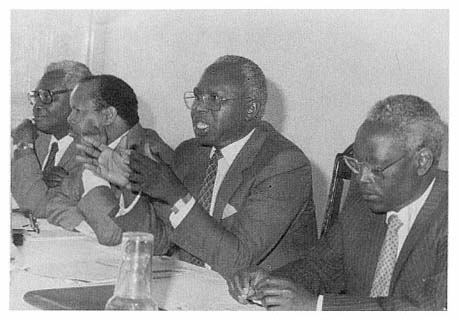
1.
The civil service core of Kenya's economic decision making in 1986: (from left)
Harris Mule, Permanent Secretary to the Ministry of Finance; John W. Githuku,
Permanent Secretary to the Ministry of Planning and National Development;
Simeon Nyachae, Chief Secretary; and Philip Ndegwa, Governor of the Central
Bank of Kenya. By permission of The Daily Nation (Nairobi).
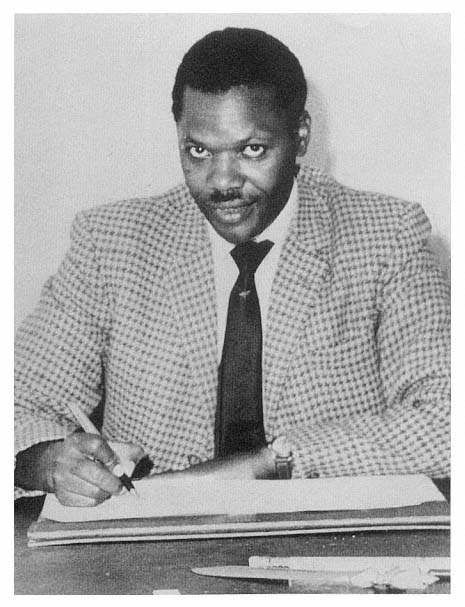
2.
Ishmael Muriithi, Director of Livestock Development in the late 1970s.
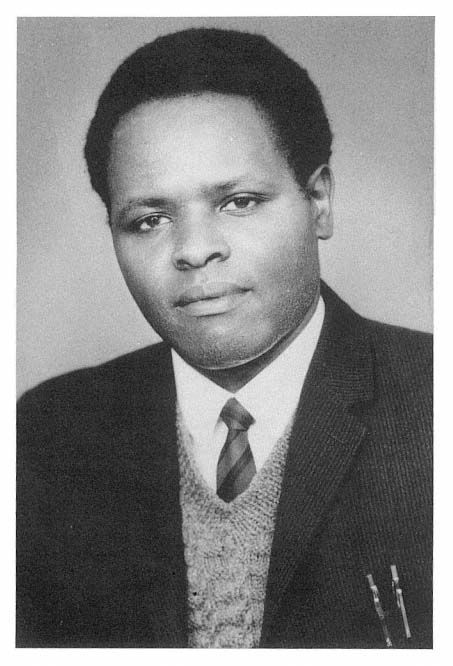
3.
Charles Kibe Karanja in 1970 when he became General Manager of KTDA.
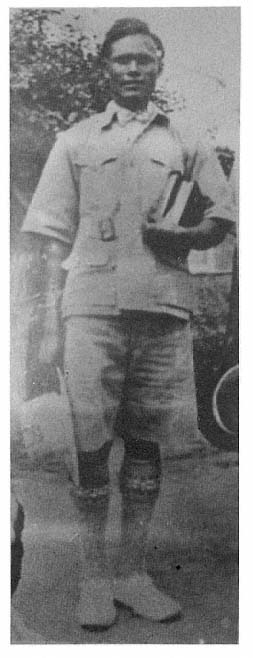
4.
Philip Mule, father of Harris Mule, in 1930. Note the elaborately European dress.
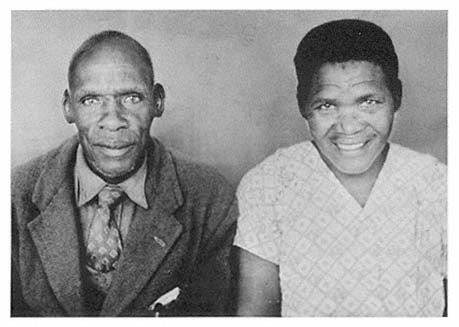
5.
Elijah Waicanguru, retired Tribunal Court Elder, and Lydia Wangeci, parents of
Ishmael Muriithi.
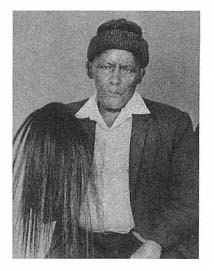
6.
Karanja wa Kiarii, father of Charles Karanja.
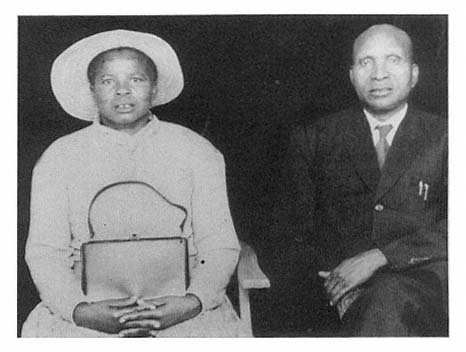
7.
The parents of Simeon Nyachae, Chief Musa Nyandusi and his wife Pauline Bosibori,
in the late 1940s.
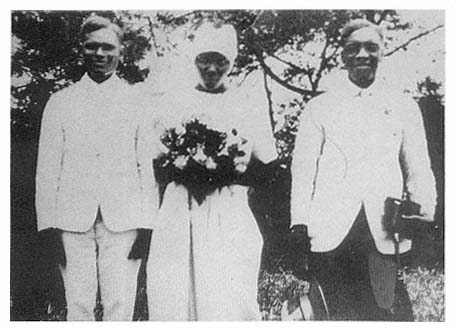
8.
Philip Mule (left) and Ruth Katuku (center), parents of Harris Mule, at their
wedding in 1930.
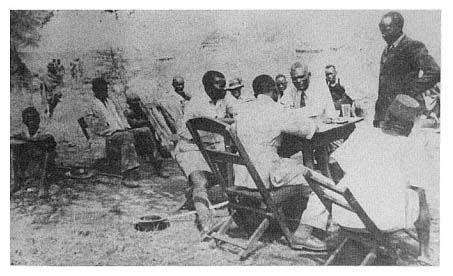
9.
Philip Mule (at table, facing camera) presiding at a session of the African Tribunal
Court for Southern Machakos in the early 1950s.
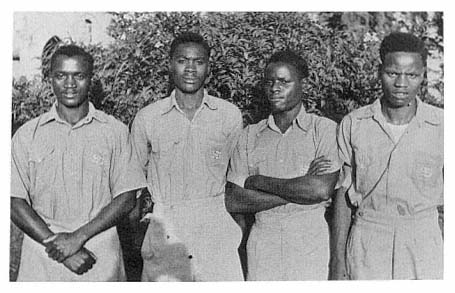
10.
Schoolboys at Mangu High School in 1951: (from left) Francis Nderitu, later Chief
Engineer, Ministry of Works; Riphat Mwangi, subsequently a Forester;
Charles Karanja; and Frances Munge, later a senior official in the government's
Directorate of Personnel Management.
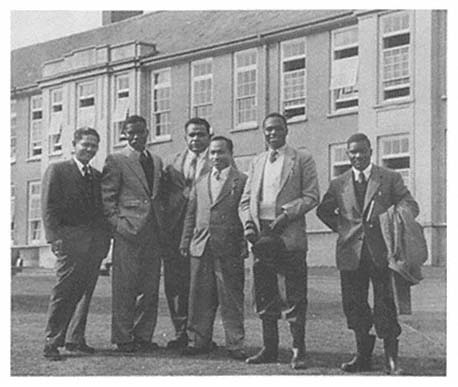
11.
Simeon Nyachae (second from right) at South Devon Technical College in the U.K
in 1957, with fellow students from Sarawak, Zambia, Borneo, and Malawi.
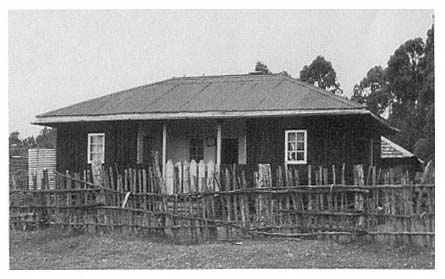
12.
The home of Lydia Wangeci and Elijah Waicanguru at Ihithe in Nyeri District.
This house was built after Ishmael Muriithi's birth but in time for Dan Mbogo to
be born here.
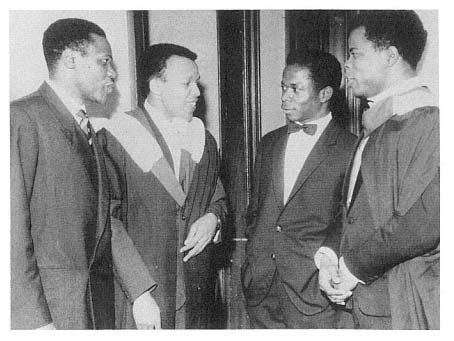
13.
Ishmael Muriithi (left) with fellow veterinary students from Zanzibar and Nigeria at
Edinburgh University (Scotland).
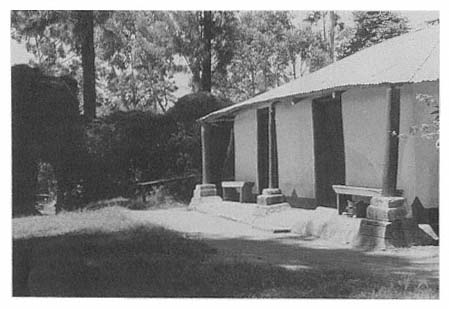
14.
The Mule family home in Mbooni, built in 1930, into which Harris Mule was born.
The corrugated iron (mabati) roof and cemented walls would have marked it as the
house of an extremely prosperous man at the time it was built.
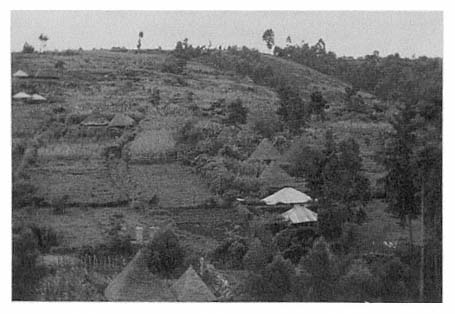
15.
Peasant farms across the road from Simeon Nyachae's house in Kisii. Note the small,
patchwork fields and the homesteads with a mixture of thatch and corrugated iron
(mabati) roofs. Farming in most of Kiambu and Nyeri (the birthplaces of Karanja and
Muriithi) is of similar density.
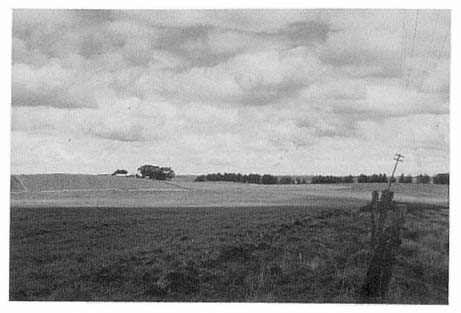
16.
Simeon Nyachae's large wheat farm at Mau Narok in Nakuru District. Compare with
plate 15.
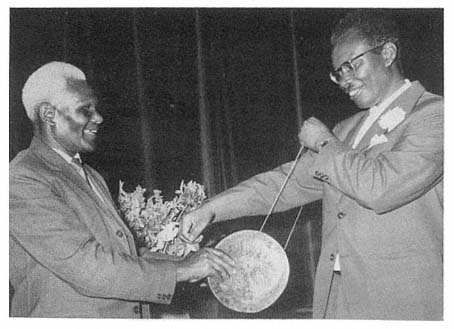
17.
Philip Mule presenting a stool to Harris Mule at the latter's wedding in 1970.
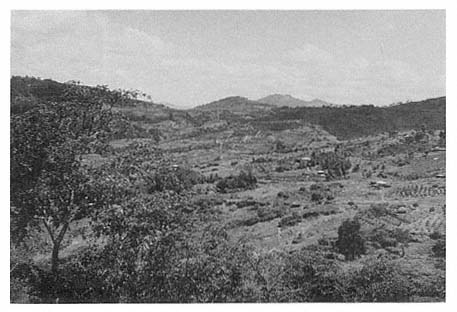
18.
The view from Harris Mule's Mbooni farm in the Machakos hills. Note the mixture of
thatched and corrugated iron (mabati) roofed houses. The farms are a bit more widely
spaced and the land much drier than in the areas around the birthplaces of the other
three administrators. (See the photograph of Kisii in plate 15.)
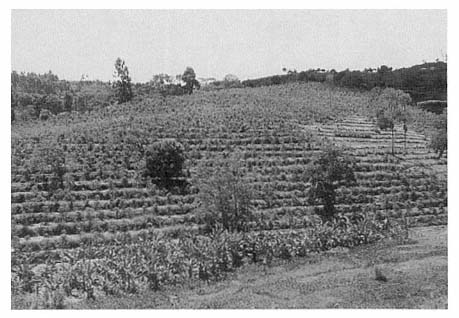
19.
Harris Mule's terraced coffee farm at Mbooni.
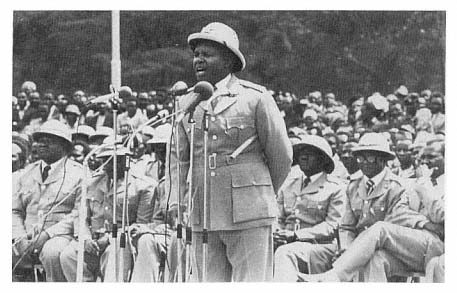
20.
Simeon Nyachae as Provincial Commissioner of Central Province addressing a baraza
[public meeting] in 1978. Note the uniform of the Provincial Administration that Nyachae
and his District Commissioners behind him are wearing. By permission of The Daily
Nation (Nairobi).
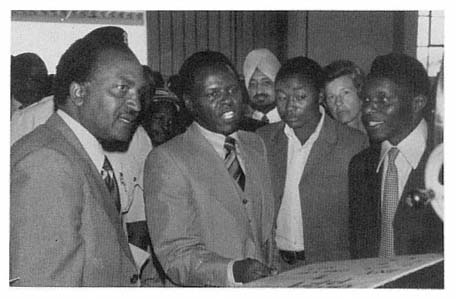
21.
Charles Karanja (center) at the opening of a tea factory with the Minister of Agriculture,
Jeremiah Nyagah (left).
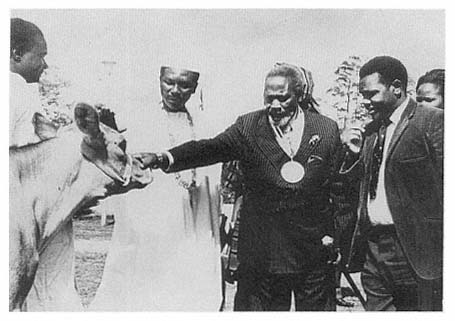
22.
Ishmael Muriithi (right) with President Kenyatta (center) and President Yakubu Gowan
of Nigeria (in white) at the Nairobi Agricultural Show in the early 1970s.
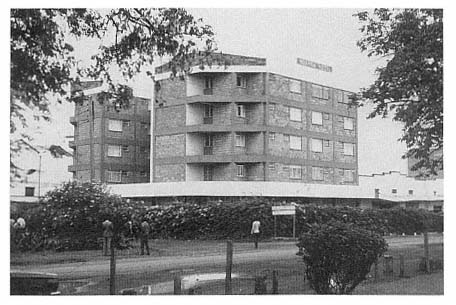
23.
The Ndanga Hotel in Ruiru, which Charles Karanja built and named after his wife,
Philomena Ndanga.
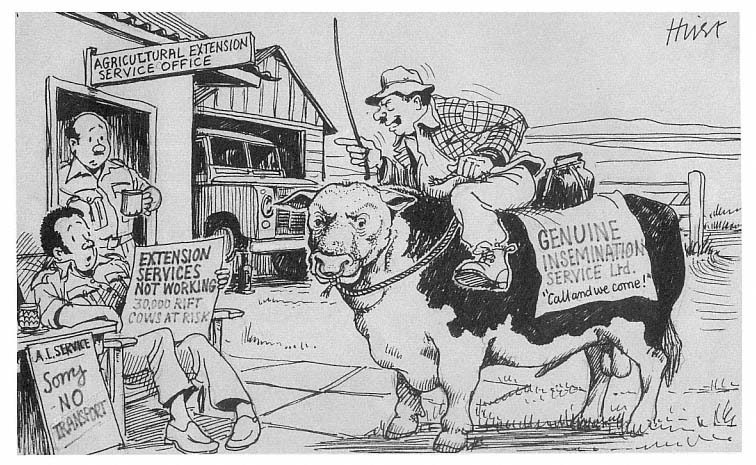
24.
"Since artificial insemination, by motor cycle and bicycle, isn't working—I'm starting a genuine insemination service by quadruped."
First published in the Daily Nation (Nairobi) February 22, 1982. Reprinted by permission of Terry Hirst, the artist.
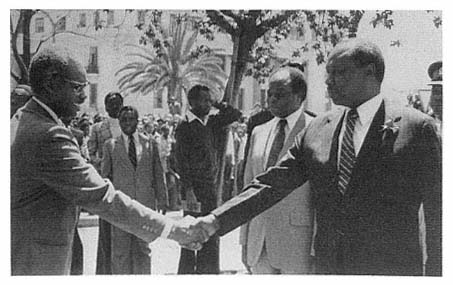
25.
Harris Mule (left) as Permanent Secretary to the Ministry of Finance shaking hands
with President Moi and welcoming Vice-President Mwai Kibaki (at Moi's right) in the
early 1980s.
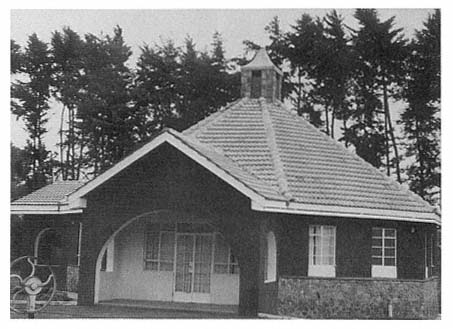
26.
The neotraditional circular house Simeon Nyachae put where his father said he
should build.
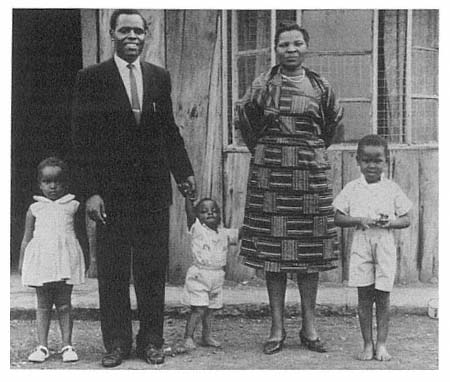
27.
Charles Karanja and Philomena Ndanga (his wife) with their children (from left)
Lucy, Thomas, and Lawrence at their home at Kiratu in 1964.
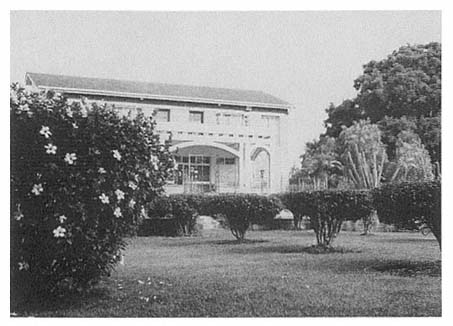
28.
The Karanja family home on their coffee estate in Ruiru, lower Kiambu District in 1986.
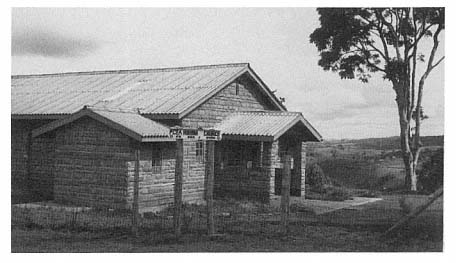
29.
The Presbyterian Church at Hubuini (in Ihithe) in Nyeri, which
Ishmael Muriithi helped build through 1976 and 1979 harambee fund-raising events.
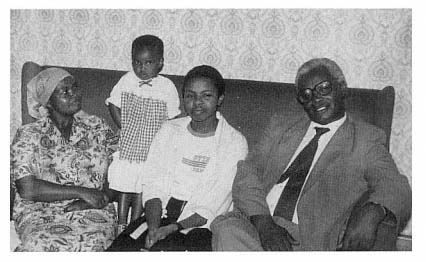
30.
Martha Ngina Mule, Ndinda, Nthenya, and Harris in 1986.